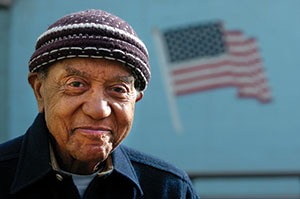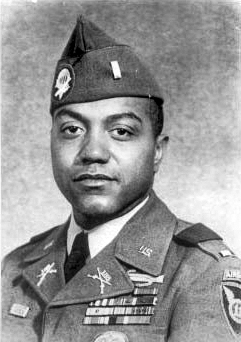
How a DAV member and courageous warrior became the first living African American World War II Medal of Honor recipient
Of the seven Black World War II Army veterans to receive the Medal of Honor in 1997, Vernon Baker was the sole survivor. More than half a century had passed between the day he led a fearless attack in German-occupied Italy to when President Bill Clinton belatedly presented Baker with the nation’s highest award for valor.
Baker was a DAV lifetime member of Chapter 9 in Fort Sherman, Idaho. He remained the only living African American veteran awarded the Medal of Honor for World War II until he died from brain cancer at the age of 90 in 2010.
Navy veteran Bob Hunt, the adjutant for Chapter 9, recalled meeting with Baker at a fundraiser to help cover the costs of his treatment prior to his death, as the Medal of Honor recipient was, at the time, not receiving benefits from the Department of Veterans Affairs.
“He was a nice man, and as some Medal of Honor recipients are, he was a bit reclusive, not wanting to trade on the medal,” said Hunt. “Our chapter was fairly small, but we donated a bit and made him a member of the chapter. We spend every penny on disabled veterans.”
Baker’s memory lives on for those in his small community and is forever woven into American military history for the intrepid assault he led on the morning of April 5, 1945.

First Lieutenant Baker—the only Black officer in his company—led 25 other infantrymen to assault a castle near Viareggio, a seaside town in northern Italy. After navigating his men through a daunting and dangerous web of German machine gun nests, he began to attack the well-fortified mountain stronghold.
According to his Medal of Honor citation, “when his company was stopped by the concentration of fire from several machine gun emplacements, [Baker] crawled to one position and destroyed it, killing three Germans. Continuing forward, he attacked an enemy observation post and killed two occupants.”
He engaged two additional machine-gun nests and occupied an exposed position to draw enemy fire away from the escaping wounded Americans. The following night, Baker volunteered to lead his battalion through German minefields and other heavy enemy defenses.
Under Baker’s leadership, the platoon killed 26 German troops and destroyed six machine gun nests, two enemy observation posts and four dugouts. In all, 17 Americans died in the battle. Baker’s “fighting spirit and daring leadership were an inspiration to his men and exemplify the highest traditions of the Armed Forces,” states the citation.
Of the 1.2 million African Americans serving during World War II, only a few were permitted to become officers—and they could only lead other Black men. Baker, who had enlisted five months before the attack on Pearl Harbor, was quickly singled out for his leadership potential. By 1943, he had completed Officer Candidate School and was commissioned as a second lieutenant with the Army’s 92nd Infantry Division—one of two all-Black divisions.
While the military awarded more than 400 Medals of Honor during the war, not a single one went to a Black service member. In 1993, the Army asked researchers at Shaw University, a historically Black college in Raleigh, North Carolina, “to determine if there was a racial disparity in the way Medal of Honor recipients were selected.”
According to the study, race indeed played a pivotal role in which “the political climate and Army practices during the war guaranteed that no Black soldier would receive the military’s top award.” The Army had previously awarded Baker the Distinguished Service Cross, the second-highest military decoration a soldier can receive for extraordinary heroism. However, after reviewing the report, a board of Army general officers selected Baker and six other African American World War II veterans to receive the Medal of Honor.
When Baker, who had settled in Idaho after the war, received a call notifying him he was to receive the Medal of Honor, he told Idaho public television, “it was something that I felt should have been done a long time ago.”
“There is a long and unfortunate part of our military history that overlooks the tremendous bravery, courage, honor and sacrifice of minority veterans,” said National Commander Butch Whitehead. “It’s important that we continue to advocate for those individuals whose contributions are deserving of merit.”
Of the other six men to receive the medal with Baker, four—1st Lt. John R. Fox, Pfc. Willy F. James Jr., Staff Sgt. Ruben Rivers and Pvt. George Watson—had been killed in action. The two others—Staff Sgt. Edward A. Carter Jr. and 1st Lt. Charles L. Thomas, who retired at the rank of major—died in the years following World War II.
When asked by the New York Times what went through Baker’s mind when being presented with the medal, he said, “I was thinking about what was going on up and on the hill that day.”
Although Baker lived to see the proper recognition he was due, other African American World War II veterans remain in waiting. Legislation to award the Medal of Honor to the late Navy veteran Doris “Dorie” Miller—one of the last sailors to flee the sinking USS West Virginia at Pearl Harbor—ultimately died in Congress. A group of U.S. senators is hopeful the honor will be bestowed on Army Cpl. Waverly Woodson Jr., a veteran of D-Day who passed away in 2005.
In 1997, Baker penned his memoir, aptly titled, “Lasting Valor.”
“Give respect before you expect it,” Baker said in the book. “Treat people the way you want to be treated. Remember the mission. Set the example. Keep going.”






